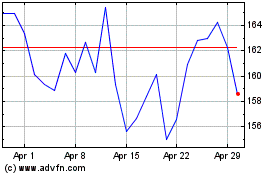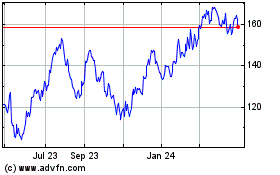Airbnb's Loss Widens as IPO Costs Add to Pandemic Hit -- 2nd Update
February 25 2021 - 5:37PM
Dow Jones News
By Preetika Rana
Airbnb Inc. posted a steep fourth-quarter loss in its first
earnings as a public company, as costs tied to its market debut
capped a year in which the coronavirus pandemic ravaged the travel
industry.
The home-sharing company reported a $3.9 billion loss in the
three months through December, which included a charge of $2.8
billion for stock compensation tied to its initial public offering
during the quarter. That compared with a loss of $351 million in
the same period a year earlier. The latest loss brought the
company's full-year deficit to $4.6 billion, more than its losses
in the previous four years combined. The loss exceeded the average
forecast of analysts surveyed by FactSet.
Revenue exceeded Wall Street's expectations. Airbnb saw revenue
evaporate in the early months of the health crisis, but that
started to change as scores of people used the platform to plan
nearby trips in the summer. Fourth-quarter revenue fell 22%
year-over-year to $859 million. Full-year revenue fell 30% to $3.3
billion. Analysts polled by FactSet had expected fourth-quarter
revenue to decline 33% and full-year revenue to drop 32%.
Airbnb has been the outlier in an otherwise battered travel
industry. Chief Executive Brian Chesky successfully pivoted the
company's strategy to focus on rural stays while hotels in big
cities suffered. At the same time, he cut a quarter of staff,
paused noncore operations and slashed the company's hefty marketing
budget to keep expenses down.
The uptick in revenue, combined with deep cost cuts, helped
Airbnb turn a third-quarter profit, boosting investor confidence
ahead of its IPO in December. Airbnb shares have climbed nearly
twofold from their IPO price. The company's market capitalization
of more than $100 billion makes it more valuable than Marriott
International Inc., Hilton Worldwide Holdings Inc. and Hyatt Hotels
Corp. combined.
Airbnb's full-year expenses rose 31% to $6.97 billion on the
back of stock IPO-related expenses in the fourth quarter. But
expenses in each category -- ranging from product development to
operations and support -- were lower before accounting for stock
compensation. For example, Airbnb's sales and marketing costs
declined 66% in 2020 compared with the year earlier excluding
stock-based compensation for employees in that division. They
climbed 44% including those costs.
Companies often point to an adjusted metric that strips the
business of such costs. Airbnb's adjusted loss before interest,
taxes, depreciation and amortization narrowed to $251 million from
$253 million in the previous year. Its fourth-quarter loss on that
basis narrowed to $21 million from a loss of $276 million a year
earlier.
While the third quarter is the busiest for Airbnb -- the company
has turned a profit in that period since 2018, including during the
pandemic -- the first quarter is the slowest. Airbnb said it
expects bookings in the three months through March to be better
than in the same period last year, when the health crisis first
struck, but below 2019 levels.
The company said it expects to spend more on marketing and
product development as a percentage of revenue in the first half of
this year than in the second half, but intends to keep costs from
soaring to pre-pandemic levels.
Airbnb's rapid growth has come with its share of challenges.
Homeowners from Arizona to Florida and Massachusetts are
campaigning for laws to govern short-term rentals amid concerns
about noise, crime and plummeting property values.
Write to Preetika Rana at preetika.rana@wsj.com
(END) Dow Jones Newswires
February 25, 2021 17:22 ET (22:22 GMT)
Copyright (c) 2021 Dow Jones & Company, Inc.
Airbnb (NASDAQ:ABNB)
Historical Stock Chart
From Mar 2024 to Apr 2024

Airbnb (NASDAQ:ABNB)
Historical Stock Chart
From Apr 2023 to Apr 2024
